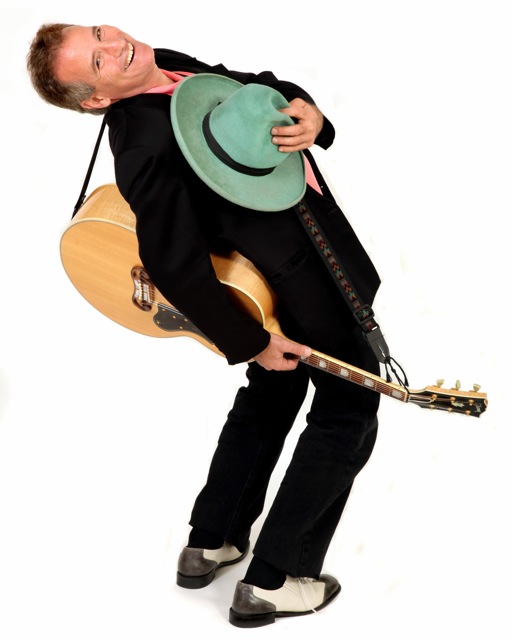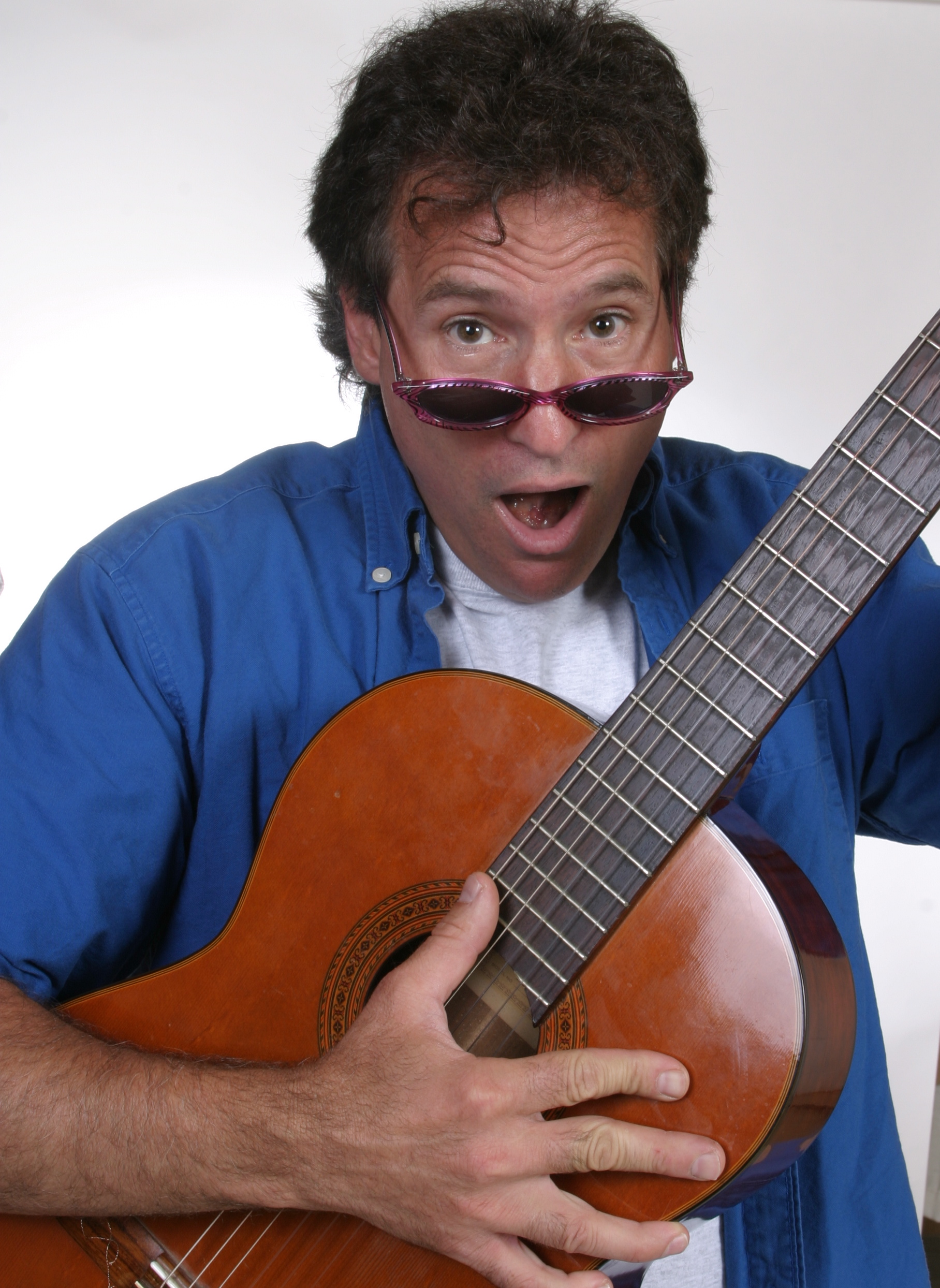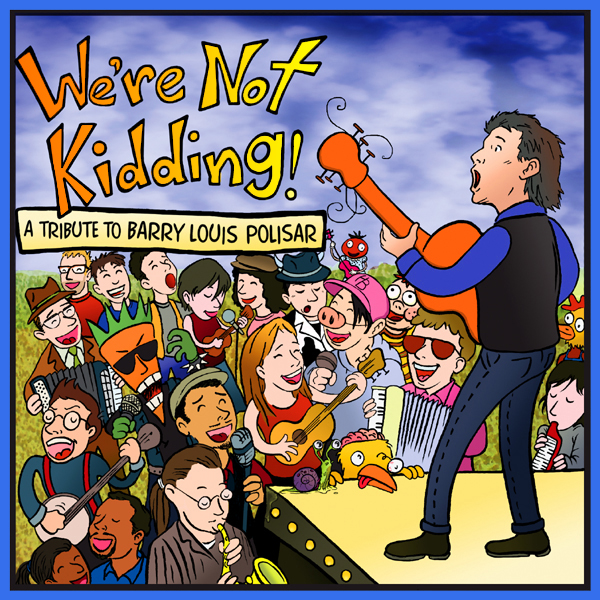Finding Contentment
The Zooglobble Interview with Stefan Shepherd
June, 2011
 Barry Louis Polisar is simultaneously children’s music best kept secret and one of the most visible (or at least audible) artist for the mainstream. A secret in that you don’t necessarily hear a lot about him within the kids music world compared to other, more active artists, but at the same time, placement of “All I Want Is You” in the movie Juno and in a new Honda ad have given Polisar a reach into popular culture that exceeds just about any independent family musician.
Barry Louis Polisar is simultaneously children’s music best kept secret and one of the most visible (or at least audible) artist for the mainstream. A secret in that you don’t necessarily hear a lot about him within the kids music world compared to other, more active artists, but at the same time, placement of “All I Want Is You” in the movie Juno and in a new Honda ad have given Polisar a reach into popular culture that exceeds just about any independent family musician.
In the interview below, Polisar talks at length about his influences, his views on the current kids music scene and his role in it, and where his creative energies are now.
What are your musical memories from childhood?
My main influences were Johnny Cash and Alvin and the Chipmunks. I have a recording on my website of me singing Cash’s “Ring of Fire” when I was about seven years old and it was always a favorite song. Alvin and the Chipmunks certainly gave voice to the naughty, rebellious side of childhood back in the late fifties — and the very first flier advertising my songs included the line “picking up where Alvin and the Chipmunks left off.” I also liked the witty lyrics and humor in Roger Miller’s songs which were popular in the early sixties and another favorite was the Australian singer Rolf Harris who had a hit with “Tie Me Kangaroo Down Sport.” To this day I can sing every line of every song from his album and many of those songs would be considered wildly inappropriate now by some parents.
I’ve read you first started writing songs at school, but when did you seriously begin to write music for kids?
I began my career while I was in college. I was 21 years old in 1975 — not too far removed from being a kid myself. I went to the University of Maryland and had planned on being a teacher. I had bought a guitar and was teaching myself how to play when a teacher saw me with it, and asked if I would entertain the kids at the school where she was teaching. It was at that school that I overheard another teacher yelling at her students, copied down her tirade and wrote my song “I’ve Got a Teacher, She’s So Mean.”
Because I was planning on being a teacher myself, word spread that I had written this song and the next thing I knew teachers from other schools were calling me asking me to sing that song in their schools. I ended up putting myself through college singing in the schools and after a year of concerts at schools and libraries, I had made enough to finance my first album. So even though I was still in college, I was writing and performing all the time. Sesame Street had heard about my songs — by then I had recorded a second album — and they called me to New York to talk about writing songs for a project they were working on; Big Bird recorded my song “I’ve Got A Dog and My Dog’s Name is Cat.”
About how many songs have you written/published, anyway?
I’ve never stopped to count. I think about 130 -140 songs that have been published on a dozen albums and lots more that I never recorded. I’m a harsh critic of my own work and want my songs to have the right combination of humor, irony, truth and emotion.
I’ve had many children’s artists tell me they decided to begin their career after discovering my albums or hearing my songs and I am settling into the role of elder statesman, even though I still tour actively and give concerts. It’s too much fun to stop.
When did you first realize you could make an entire career out of writing for kids?
Really, right from the start. The response to my songs was enthusiastic from the very beginning. At every concert I gave, people wanted to know who wrote the songs I sang. Hearing that all the time made me realize that I should take any money I made from my concerts and record all my songs on an album. This was in 1975 when record labels ruled the music industry. I always had an independent streak — and decided to make my own album and sell it as a “people before profit” venture.
I remember the first time I tried to get car insurance, the insurance agent asked me what I did for a living and I told him I wrote and sang songs for kids. He said, “But what do you really do for a job?” I knew I had made it when my 80-year old aunt finally stopped saying, “That’s nice, Barry, but what are you going to do for a real job?”
The kids in your songs….well, they’re not exactly mean, but they’re definitely not polite all the time. One of those early albums was even subtitled “and other songs for rebellious children.” Was that a reaction to anything in particular, or was it something that you just felt drawn to or were experiencing yourself?
I would say the kids I wrote about were real. At times impolite and maybe some of the songs I wrote were not politically correct but they represented the way kids were — not the way parents wanted them to be. We had just come out of a pretty political time and I embraced a healthy dose of rebelliousness and irony in my songs and those qualities still appeal to kids now. I would also argue that questioning is inherently a positive value.
In some ways the current generation of parents is much more conservative than the generation of the fifties; they want to make sure that the songs their kids are exposed to carry a message and communicate a specific agenda. I’ve had parents tell me I should write songs that teach children good manners, or teach children to respect the environment — or teach children about peace and justice. They want pamphlets, not poetry. I prefer to write and sing for kids and smart adults who understand the irony and humor of everyday life and can laugh at themselves. There are lessons everywhere: I’d rather let people connect their own dots.
My writing style is closer to writers like Hilaire Belloc, Jim Copp and Shel Silverstein. They have all written cautionary tales and humorous odes to misbehavior because they realized that kids are much smarter than some of us think they are.
How is the kids music scene now better than when you were releasing lots of albums in the 70s and 80s? How is it worse?
The new way of recording and posting a song makes things much more democratic — anyone can do it now — but there are no longer any filters so there are times when it feels like everyone with an instrument feels like they can make a recording for kids; subsequently, the quality is all over the map. I think that some of the songs aren’t as smart as they used to be. I see a trend where some artists just decide to write about something — and some of those songs sound as if they locked themselves in a room until they emerged with a song on a given topic. Often times, what carries the songs are the visuals in a video — and that was never an option when I began writing. My songs had to communicate a story and create a picture.
There are some really great artists and performers now but it’s harder for them to emerge from the larger pack. The blogging world is an interesting phenomenon too and many bloggers work off the same lists of favorite artists, despite pledging fidelity to independence.

While you’ve had your songs out there quite a bit (Juno, the tribute album, etc.), you haven’t released an album of new material in quite some time (1999’s A Little Different). Is there a particular reason for that? Has writing books taken the place of writing songs, creatively?
I’m still writing all the time and I have the luxury of being able to write about anything I want to write about — in any discipline. I don’t want to turn out more songs just for the sake of putting out a new album and a lot of songs I hear seem like they are written to have product to sell. I have to be pulled to a subject and to feel that what I have created — in the words of Robert Frost — are written for heaven and the future’s sake.
I have been concentrating on books lately. In addition to my story books, I’ve written and adapted a Passover Haggadah for adults, a chapter book for older kids on the Amistad slave rebellion, and lots of poetry books for kids. A Little Different was my last album of new songs, but in 2005 I released a double album of songs called Old Enough to Know Better: The Worst of Barry Louis Polisar. As my daughter was going off to college, she discovered a trove of songs she hadn’t heard before. These were songs I considered flawed and she challenged me to take my worst songs and turn them into new piecee…so even though the titles and some lyrics were original, I basically edited and re-wrote forty new songs. In fact, I joked that this was a double album because I had written so many bad songs.
Many of the songs on this double album are totally different from the originals and only share a common title. I think that was some of my best work, but the album was largely ignored in the press and in the blogging world. Ironically, it’s harder for me to get my albums reviewed now — perhaps because there are so many children’s releases and many independent artists have hired press agents and PR people — and I have not.
I have written a lot of songs about my family, my kids, school, parents, teachers… and for me to write something new, I’d want to be able to really say something that I have not said before…It’s actually harder for me to come up with songs that I think are fresh and original — and don’t sound like ideas I have mined before. My own kids are now in their mid-twenties and I am in my mid fifties, so the original voice I wrote with — that rebellious kid — does not ring true for me anymore.
Do you feel like you’ve finally reached some sort of broad level of popularity and cultural acceptance? Or did you always feel that way?.. Neither of which is relevant to whether or not you cared.
I think every artist hopes to create things that resonate with people and I have known for years that my songs did that. The We’re Not Kidding! tribute album really confirmed that for me — but I have been getting emails and letters from adults for many years now, expressing how my songs touched their lives in such a profound way when they were younger. Of course Juno — and now the Honda ad — have brought my work to a whole new level. I’ve sold about 350,000 albums and books as an independent artist. The Juno soundtrack sold 600,000 copies in 4 months and sold over a million copies a few months later. I could never do that as an independent artist.
Having my song in Juno gave me a lot of street credibility. I’ve always felt like an outsider, doing my thing under the radar. I think it’s hard to be a satirist and not ruffle feathers and I’ve frankly been amazed that I’ve sustained a healthy career for over 35 years. The folk community didn’t think of me as a folk artist, even though that was the tradition I was writing, singing and recording in — and the children’s music movement often found me too irreverent and maybe even a little edgy –though I never thought of myself that way. My songs often have an ironic side to them and they are meant to be funny but the children’s music movement has been very earnest at times. I was an independent voice for kids music before there was a movement and I like that the children’s music field has expanded beyond the traditional boundaries.
Do you have a favorite Juno-related moment — something that happened as a result of that song placement?
Well, the way that whole thing came about was nothing short of cosmic. I wouldn’t have even had my older albums on iTunes for the director of Juno to discover, if it wasn’t for the fact that the owner and founder of CDBaby was a fan of my music. Before he founded his music company, he had been singing and performing my songs for years and he offered to put my whole catalog on line as a “thank you” for all those years of playing my songs in public. By doing that, all my songs went to iTunes and that’s when Jason Reitman, the director of Juno, stumbled onto “All I Want is You.” Jason was looking for another song with a similar title and typed in my song title by mistake.
Nothing beats the emails I’ve gotten from adults writing about what it was like to be in a dark movie theatre and suddenly hear my voice again; many fans from the old days had taped my albums or gotten them from the library — the original file sharing — and knew my voice and my songs but could never remember my name. Suddenly, I was singing to them again.
What’s really weird for me is how this song — which was recorded as “filler” on my second album in 1977 and sat un-noticed for thirty years — speaks to people. There are hundreds of versions of college-aged kids singing my song in their dorm rooms on YouTube. I still get about 4-5 notices a month from people who have used my song in their weddings. I don’t make anything from these uses but it’s an amazing feeling to be able to write a song that resonates with people like that.
There wasn’t a lot of money involved in the song placement in the film but it was providential for me and has led to my songs traveling all around the world. I’ve had a lot of songs used on TV shows and in commercials in Australia, Ireland, England, Europe, Mexico, and so on.
I never pitched my songs — and still don’t — but the licensing requests have really tripled since Juno. I just got a request for two other songs I wrote to be in two new films coming out later this year.

What’s next up for you?
The tribute album that Aaron Cohen produced touched my soul in a really profound way. Juno brought fame and mainstream notoriety but having my songs recorded by other artists — most of whom had my albums as kids growing up — is something that is nothing short of amazing to me. Aaron has been talking about doing a dvd of the songs with animation and there’s even talk about his producing another volume of songs. Right now, I just want to savor the joys that the first two discs have produced. I think the song covers these artists recorded are fun, engaging and wildly creative. Makes me want to cash in my chips and ride off into the sunset.
I’m still singing in the schools and libraries — I don’t get too many high profile shows in performing arts centers, festivals or theaters — perhaps because I’ve never had an agent and don’t solicit work and I’m better known to teachers and librarians who appreciate the literary traditions my work is rooted in. I’ve got a new book of poems that is almost finished and a couple other book ideas in the works. It will be interesting to see what happens when these other songs appear in these upcoming films — and if people will even make the connection that they are my songs.
I still get ideas for songs from time to time and have been exploring the idea of an album where I answer other people’s songs. I’ve done that a bit on past albums. One of my favorite books is A Book of Answers by the Australian poet A. D. Hope. He wrote a series of poems responding to famous poems and it’s a real hoot.
I never expected to have a career that would span 35 years. Maybe my kids will have children one day and I’ll have a whole new view of childhood to explore. Meanwhile, I’m happy and content doing what I’ve been doing. Finding contentment in your own world is a worthy thing.
Photos by Michael G. Stewart